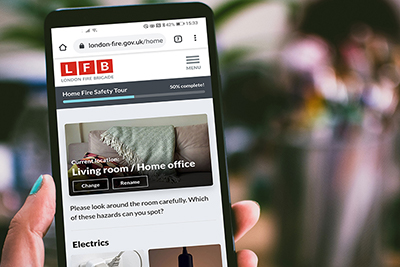Fire risks of batteries and chargers explained
How safe is your bedside table? Do you pop your phone on to charge before bed? Maybe you love to watch TV on your laptop or tablet in bed – plugged in to keep the screen bright, of course? Let's take a closer look at how many of us use everyday electrical items – and the fire risks many of us leave ourselves open to without realising it. But first let's start at the beginning...
What is a Lithium battery?
Lithium batteries are the lightweight, rechargeable batteries that power our phones, laptops and cameras. They're found in many electrical devices from mobility scooters to e-cigarettes, and are used safely by millions of people every day. However, there are some things you need to know when it comes to fire safety, chargers and batteries.
Are batteries dangerous?
When used properly, no. But batteries can present a fire risk when over-charged, short-circuited, submerged in water or if they are damaged. It's really important to charge them safely too.
How to stay safe
Firefighter safety tips for charging your devices
- Always use the charger that came with your phone, tablet, e-cigarette or mobile device.
- If you need to buy a replacement, always choose a branded, genuine product from a supplier you can trust. There are lots of fakes out there, and it can be difficult to spot the difference.
- Avoid storing, using or charging batteries at very high or low temperatures.
- Protect batteries against being damaged – that's crushed, punctured or immersed in water.
- Don’t leave items continuously on charge after the charge cycle is complete – it's best not to leave your phone plugged in overnight for example.
- Never cover chargers or charging devices – that includes using your laptop power lead in bed.
- When you travel, avoid keeping all your items containing lithium ion batteries together, especially on a plane. Check with your flight carrier for additional information or advice.
- Don't overload your sockets – learn more about how much is too much on the fuses and power load page.
Did you know?
Counterfeit electrical chargers can be deadly – many fail to meet UK safety regulations leading to fires and injury. What may seem like a bargain at the market isn't worth the risk when you consider that it could cost a family member's life
If your battery starts swelling or expanding...
- Stop charging immediately
- Turn off the device
- Do not remove the casing or tamper with the equipment
- Contact the manufacturer or certified technician

Check your home's safe using our simple tool
It only takes a few minutes to check your home and get tailored advice for your family.
